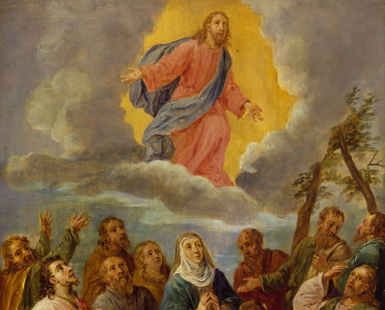The Ascension of Christ is Our Exaltation
-
 There is a liturgical principle stated in Latin, “Lex orandi statuat legum credendi,” which means, “the law of prayer establishes the laws of belief.” Today’s liturgy gives us a great example of this principle. The Solemnity of the Ascension of the Lord invites us to believe in more than the fact that the glorified body of Jesus ascended from earth to heaven. The prayers of the liturgy invite us into a much higher reality, to contemplate the relevance of the Ascension for ourselves. Let us review these prayers for our edification.
There is a liturgical principle stated in Latin, “Lex orandi statuat legum credendi,” which means, “the law of prayer establishes the laws of belief.” Today’s liturgy gives us a great example of this principle. The Solemnity of the Ascension of the Lord invites us to believe in more than the fact that the glorified body of Jesus ascended from earth to heaven. The prayers of the liturgy invite us into a much higher reality, to contemplate the relevance of the Ascension for ourselves. Let us review these prayers for our edification.
The Church gives us two Collects (Opening Prayers) to choose from, both of which apply the relevance of the Ascension to ourselves. The first speaks of Jesus as the Head and we, the Church, as His Body saying that “the Ascension of Christ… is our exaltation, and, where the Head has gone before in glory, the Body is called to follow in hope” (cf. Ephesians 1: 22-23). The second Collect applies that hope even to our present reality praying that we, who believe that Jesus has “ascended this day to the heavens, may in spirit dwell already in heavenly realms.”
The Prayer Over the Offerings describes the Eucharist as the way through which we ascend with Christ, asking the Lord to “grant, we pray, that through this most holy exchange we, too, may rise up to the heavenly realms.”
Preface I and Preface II of the Ascension (before the Holy Holy) both express similar ideas relating the Ascension to ourselves. Preface I resembles the first Collect in proclaiming that the Lord Jesus “ascended, not to distance himself from our lowly state but that we, his members, might be confident of following where he, our Head and Founder, has gone before.” What does it mean for us to follow where he has gone before? Preface II boldly proclaims that Christ our Lord “was taken up to heaven… that he might make us sharers in his divinity.”
That we might become sharers in the divinity of Christ may sound like an outlandish hope, an incomprehensible fantasy for us lowly sinners. But it occurs again in the Prayer After Communion: “Almighty ever-living God, who allow those on earth to celebrate divine mysteries, grant, we pray, that Christian hope may draw us onward to where our nature is united with you” (cf. 2 Peter 1:4).
These prayers express a theology that flows from the Church Fathers referred to as “deification.” And lest we think that the prayers of the Ascension are a rare occurrence of this theology, I point to a prayer that the priest says at every Mass. He does not speak it aloud during an Offertory Hymn, but you may hear this prayer during a weekday Mass. After offering the bread to God and praying “Blesse be God forever,” he mixes a few drops of water into the chalice of wine and prays: “By the mystery of this water and wine may we come to share in the divinity of Christ who humbled himself to share in our humanity.” (I find this to be a compelling reason to offer the Sacred Chalice to everyone in the assembly, along with the command of Jesus, Himself, to “take and drink.” Did Jesus intend only priests and deacons to do this in memory of him?)
“The law of prayer establishes the law of belief.” This weekend we pray to be taken up with Christ into heaven; that he might make us sharers in his divinity; that, in spirit, we may dwell already in heavenly realms. The Church translated these prayers from Latin into the vernacular because She wants us to understand them and believe their theology. When we understand our prayers we understand our faith, even if it seems too good to be true.
“All you peoples, clap your hands, shout to God with cries of gladness, for the Lord, the Most High, the awesome, is the great king over all the earth” (Psalm 47: 1-2).
